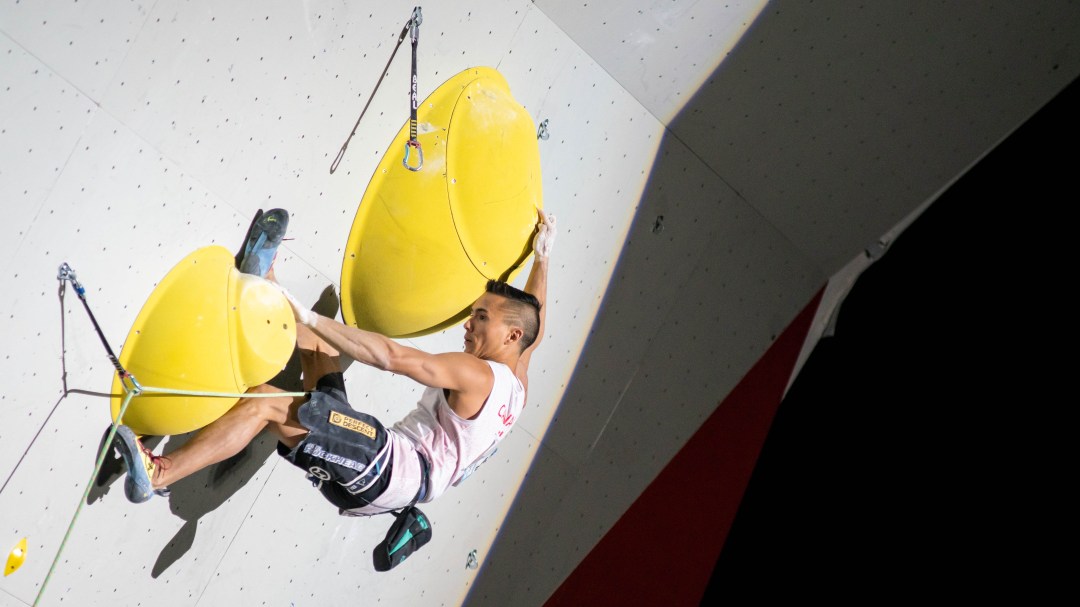Sean McColl tells first time fans what to watch for in Olympic sport climbing
On August 3, 2016, Sean McColl was in Salt Lake City, huddled in the corner of a huge convention centre, glued to his phone to watch a live stream that could change his life.
On screen, the results of the vote that decided the fate of five sports up for inclusion at Tokyo 2020 were being revealed. Among them was sport climbing – McColl’s passion-turned-career.
“All of a sudden, in the sport that I had fallen in love with, I now had a chance to become an Olympian,” McColl told Olympic.ca in December 2019 about hearing the unanimous vote in sport climbing’s favour.
As Canada’s first world youth champion, McColl turned pro before he was 20. Though he thought he might start a “quote unquote real job”, within a few years he was making ends meet through sponsorships and prize winnings. But it was still difficult to clearly tell a young climber where they could go in the sport until he got the news that his Olympic dream was a step closer to reality.
READ: McColl and Yip to represent Team Canada in sport climbing Olympic debut
It was particularly special for the four-time combined world champion because of the role he played in sport climbing’s Olympic journey. Serving as president of the IFSC’s athlete’s commission since he was elected in 2012, he made compelling presentations to the IOC on behalf of his sport. One of his key arguments was the young demographic of sport climbers.
“Climbing is a very natural part of our progression as a kid,” McColl also explained. “We learned how to crawl and then most kids actually learned how to climb, climb up chairs, studying themselves in order to learn how to walk. They climb, they stand, then they fall over for a bit, and then they walk”.
Furthermore, the sport is a literal manifestation of the Olympic motto, Citius, Altius, Fortius. As McColl noted, sport climbing “uses the verticality. And so when the Olympic motto is faster, higher, stronger, it is literally going higher and generally the person that climbs the fastest wins.”
With sport climbing set for the spotlight of the world’s biggest stage, McColl helps us break down what fans should be looking for if they’re tuning into his sport for the first time.
RELATED: Learn more about sport climbing at Tokyo 2020
There are three disciplines in sport climbing: speed, boulder, and lead. At Tokyo 2020, all three will be included in a single combined event. Athletes will receive points for their rankings in each discipline which count towards an overall total.
McColl says speed is “easiest to digest” as it’s all about how fast someone can climb the 15-metre high wall.
Bouldering is, in some ways, the opposite of speed. Climbers attempt to scale as many routes as they can on a four-metre high wall within a five-minute time limit. McColl calls it a “problem solving five minutes” as climbers don’t know the routes until they’re on the wall.
“You see your start hold where you start and you see the end and you have to figure all the rest out by yourself. So we’re looking for which way the holes are facing, where the feet are, we’re going through hundreds of moves in our head of how to get through the sequence.”
Spectators will often see climbers fall and remain on the mats below, examining the routes, and attempting to solve the puzzle before getting back up.
McColl describes this aspect of televised sport climbing as “you can almost see the gears turning in their head. ‘What did I do wrong? What can I change? How much time do I have left? How many more tries can I do?’”
In lead climbing, the athletes are given six minutes to scale a wall that is at least 15 metres tall. Attached to a rope, climbers hook into quickdraws attached to the wall. So what’s the catch?
“It’s a one-shot deal. As soon as they fall, it’s over.”
Climbers are scored by the final quickdraw that they were able to reach. If more than one climber finishes at the same hook, the tiebreaker is how fast the climber reached their final quickdraw. This puts pressure on both being accurate and methodical, but also bringing a little speed to the course.
“Me personally, I do like to have a really really good fast pace and I like to make decisions really really quickly. So, you’ll see me most likely [climb] for three minutes and I go quite quickly up those lead routes.”
Given the significant differences in the disciplines, it’s almost impossible to master all three.
“Most of the climbers that go to the Olympics will be strong in two,” said McColl. “I’m quite good at lead and boulder and I’m getting better at speed.”
“There are a few that are really good in three, but not the best at all three. So it’s a complicated formula,” he added.
“On the competition day, it doesn’t matter what PB [personal best] people have. It’s exactly whatever you run. I can definitely win if I have a great day”.

